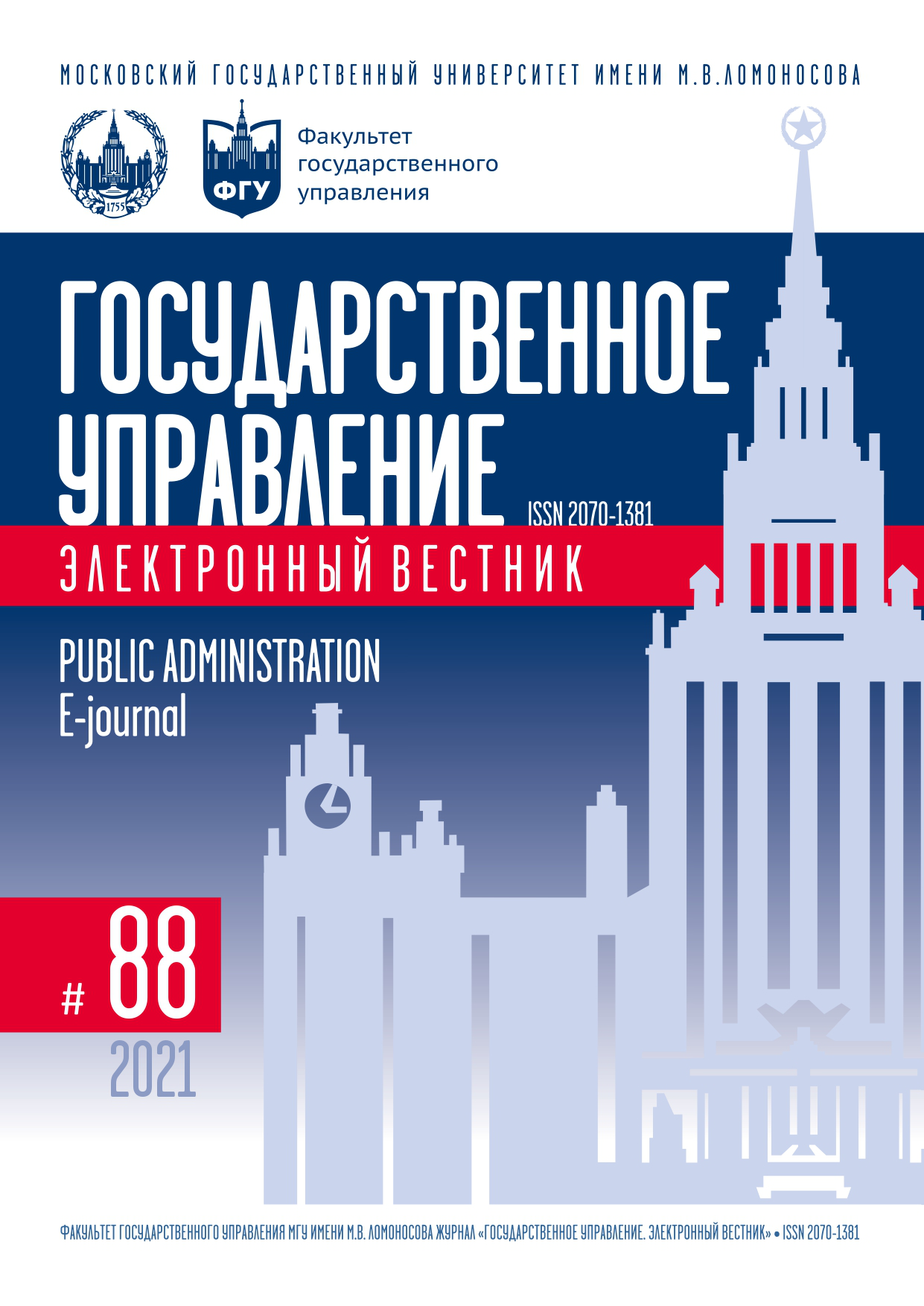Information War as a Political Challenge of Postmodernity (Based on the 1999 Parliamentary Elections)
Keywords:
S.L. Dorenko, E.M. Primakov, A.A. Veshnyakov, elections, information war, postmodernityAbstract
The 1999 parliamentary elections were remembered for the unprecedented discrediting of well-known candidates who dared to challenge the “Kremlin party”. The most striking example of “information bacchanalia” was Sergei Dorenko’s author’s TV program, which was aimed at discrediting the leaders (E. Primakov and Y. Luzhkov) of the electoral association “Otechestvo — Vsya Rossiya”. Almost every researcher studying the elections to the Third Duma cannot ignore this scandalous television project. At the same time, the “Dorenko phenomenon” as an important information and political factor of the 1999 elections has not yet received a deep and comprehensive understanding. The authors generally limit themselves to mentioning the most brilliant moments of the well-known “election series”, while pointing out the inadmissibility of the techniques and methods used by the well-known “telekiller”. At the same time, it remains unclear why the “Program of Sergei Dorenko” produced such a strong political effect, which surpassed the agitation and propaganda efforts of almost all political parties. It is hardly possible to explain this phenomenon only by the “talent” of the program host, who masterfully used the art of “black PR”, without immersion in the ontological essence of the well-known media strategy. The aim of the article is to analyze “Program of Sergei Dorenko” as a kind of media game, which was played in the coordinates of the socio-cultural paradigm of postmodernity. The essence of this game remained unclear for opponents and contemporaries considering this project only as “mediamurder” and “war of compromising materials”. A new reading of this topic became possible due to the intensive development of modern information and communication practices and media discourse in recent years.
References
Бузин А.Ю. Российские выборы: изнутри, снаружи, сбоку. М.: КнигИздат, 2020.
Вахрушев В.С. Постмодернизм… И несть ему конца? // Волга. 1999. № 10. URL: https://magazines.gorky.media/volga/1999/10/postmodernizm-i-nest-emu-koncza.html
Волгин Е.И. Проблема сохранения смешанной избирательной системы в РФ во второй половине 1990-х гг. // Вестник Московского университета. Серия 8. История. 2020. № 6. С. 116–142.
Калашников И.Е. СМИ как инструмент отстаивания политических интересов финансовых элит в России 1991–2000 гг. на примере «Программы Сергея Доренко» // Молодой ученый. 2018. № 24(210). С. 241–244.
Каширин А.А. Сравнительный анализ экстралингвистических особенностей авторских информационно-аналитических телепрограмм // Экология языка и коммуникативная практика. 2017. № 4. С. 59–71.
Логинов Г.А. Цивилизация постмодерна как гностическая цивилизация и торжество небытия // Credo New. 2018. № 2. URL: http://credo-new.ru/archives/1368.
Скайнер Л. Публичные выборы и частные интересы. Роль СМИ в российских парламентских выборах 1999 года // Конституционное право. Восточноевропейское Обозрение. 2001. № 4. С. 30–42.
Тарасенко Т.П. Медийные метафоры в предвыборном дискурсе как трансляторы лингвоментальной картины мира // Филологические науки. Вопросы теории и практики. 2017. № 12-3. С. 167–170.
Цуканов Е.А. Медиакиллерство как гностическая дискурсивная практика // Дискурс-Пи. 2018. № 3-4(32-33). С. 183–191. DOI: 10.17506/dipi.2018.33.4.183191.
Enikolopov R., Petrova M., Zhuravskaya E. Media and Political Persuasion: Evidence from Russia // American Economic Review. 2010. Vol. 101. No. 7. P. 3253–3285. DOI: 10.1257/aer.101.7.3253.
McFaul M. Russia’s 1999 Parliamentary Elections: Party Consolidation and Fragmentation // Demokratizasiya. 2000. Vol. 8. No. 1. P. 5–23.
White S., Oates S., McAllister I. Media Effects and Russian Elections // British Journal of Political Science. 2005. Vol. 35. No. 2. P. 191–208. DOI: https://doi.org/10.1017/S0007123405000116.
Downloads
Published
Issue
Section
Categories
Similar Articles
- Sergey A. Reznichenko, Aleksey A. Gavrishev, State Support System for Russian Mass Media Activities to Promote Their Products to Foreign Information Markets in the Context of Information Wars , Public Administration. E-journal (Russia): No. 96 (2023)
- Nikita A. Lomagin, The Role of Foreign Intelligence in Decision-Making during the Great Patriotic War: New Documentary Materials from the SVR Archive , Public Administration. E-journal (Russia): No. 113(S) (2025): Стратегии государственного управления в годы Великой Отечественной войны
- Alexander O. Naumov, Marina V. Belousova, Natalia V. Andreeva, From Propaganda to Public Diplomacy: The Emergence and Development of an Original Concept , Public Administration. E-journal (Russia): No. 96 (2023)
- Vladimir O. Mikryukov, Arina V. Koroleva, Petr P. Shevel, Election Results Expert’s Forecasting: Advantages and Disadvantages (on the Example of the Elections of the State Duma of the Federal Assembly of the Russian Federation of the 8th convocation) , Public Administration. E-journal (Russia): No. 93 (2022)
- Vyacheslav A. Nikonov, Public Administration during the Great Patriotic War , Public Administration. E-journal (Russia): No. 113(S) (2025): Стратегии государственного управления в годы Великой Отечественной войны
- Lyudmila I. Bushueva, Yulia F. Popova, Assessment of Information Interaction between the Authorities and Business (Based on Data from Competitive Environment Monitoring in Komi Republic) , Public Administration. E-journal (Russia): No. 86 (2021)
- Tatiana N. Yudina, Anna V. Bogomolova, Olga V. Petuhova, Arkady P. Vainshtok, Support for Families with Children as a Direction of Social Policy and Task of Strategic Management: Experience and Problems of Forming an Information Resource for Analysing the Situation of Families with Children in Russian Federation Regions , Public Administration. E-journal (Russia): No. 88 (2021)
- Eugenia V. Andryushina, Infodemic as a Factor of Social Security and Anti-Infodemic Policy , Public Administration. E-journal (Russia): No. 95 (2022)
- Dina A. Amanzholova, Features of Constructing the Memory of the Great Patriotic War: An Example of the Former Soviet Republics of Central Asia and Kazakhstan , Public Administration. E-journal (Russia): No. 113(S) (2025): Стратегии государственного управления в годы Великой Отечественной войны
- Alexander V. Sidorov, Growing Crisis in the USSR Economy: An Assessment by the Country’s Leadership (Autumn 1989) , Public Administration. E-journal (Russia): No. 87 (2021)
You may also start an advanced similarity search for this article.




